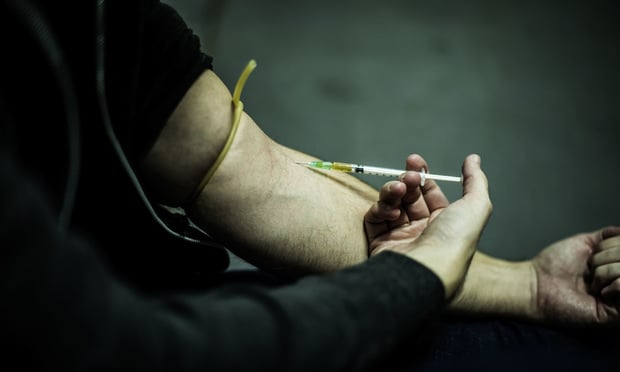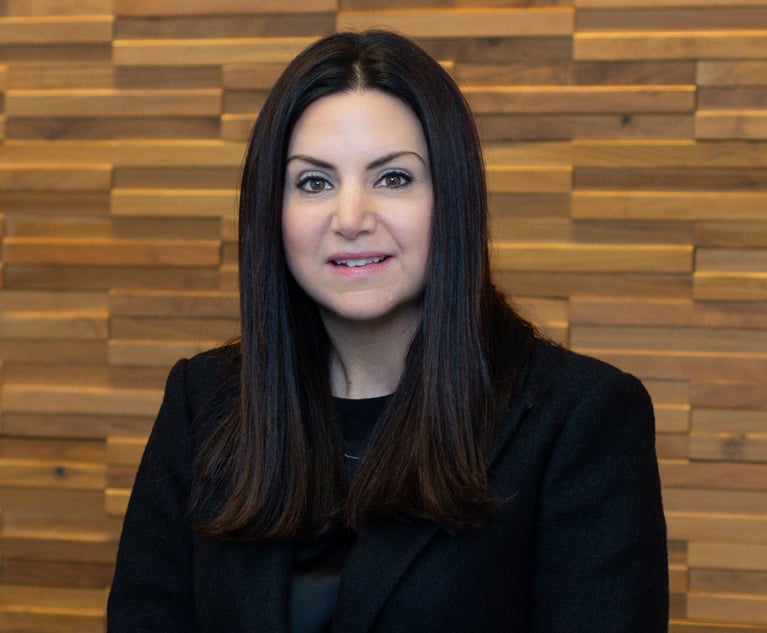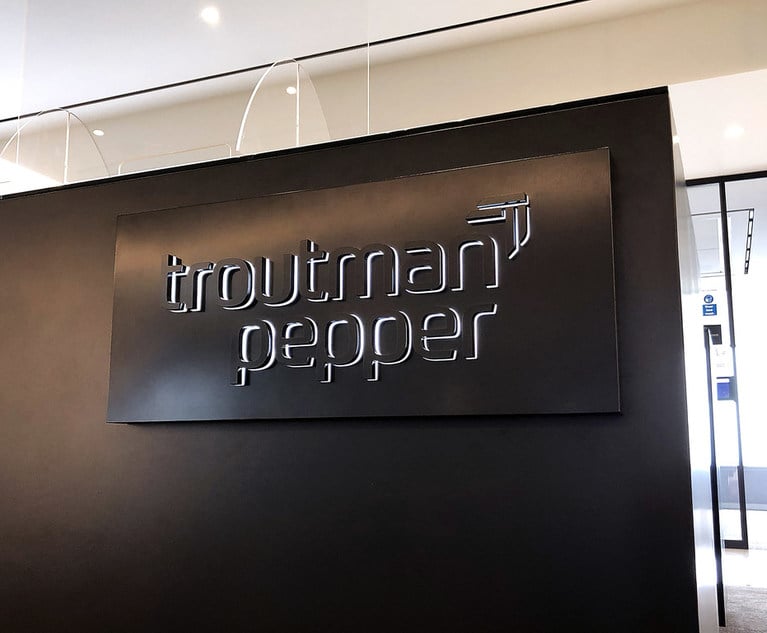McSwain, DLA Piper's Appellate Head Spar Over Legality of Safe Injection Site
U.S. Attorney William McSwain said the introduction of safe injection sites invited unsafe and illegal drug use, while a DLA Piper lawyer representing the nonprofit company seeking to manage the site said there was no intent to promote drug abuse, and that it was aimed at creating access to medical care.
September 05, 2019 at 06:52 PM
5 minute read
 Photo: Shutterstock
Photo: Shutterstock
Arguments in Philadelphia federal court Thursday over whether a proposed supervised injection site would violate the Controlled Substances Act focused on the purpose of opening such sites and what consequences—both intended and unintended—might arise.
In nearly two hours of arguments before U.S. District Judge Gerald A. McHugh of the Eastern District of Pennsylvania, U.S. Attorney William McSwain said the introduction of safe injection sites invited unsafe and illegal drug use, while a DLA Piper lawyer representing the nonprofit company seeking to manage the site said there was no intent to promote drug abuse, and that it was aimed at creating access to medical care.
According to Ilana Eisenstein, DLA Piper's appellate co-chair, who represented Safehouse, which seeks to open the country's first safe injection site, its purpose is akin to that of emergency medical staff and first responders, who provide lifesaving medical care to overdose victims. But McSwain said the unintended purpose of the site would be to allow, and even promote, unlawful drug use.
McSwain, whose office sued Safehouse in February seeking a declaratory judgment saying the proposed site—where heroin users would inject the drug under the supervision of medical staff—is illegal under the Controlled Substances Act, said he was skeptical of the assertion that the purpose of the site is to dissuade people from drug use, and said that, under the law, the court also needed to focus on the "necessary preconditions" that go along with the stated purpose. In this case, those preconditions would be inviting people onto the group's property to do drugs.
"I think that would be engaging in make-believe for us to say that the purpose of Safehouse is to get people to stop using drugs," McSwain said. "That's going down a path that's anti-factual."
When McHugh asked whether McSwain thought the group's purpose was to promote drug use, McSwain said he thought that could be part of it.
"I think it is inevitable that they are in fact promoting it," McSwain said.
McSwain further contended that there are other services in the city that promote addiction treatment and medical care, but the only difference is that Safehouse would be inviting addicts who use their services to inject heroin on their property.
"I think the hubris here is pretty astonishing," McSwain said. "They're saying, we know better, but we're going to do it anyways."
The arguments came more than a week after the court held an evidentiary hearing about the ethics and policy implications of opening a safe injection site. But the hearing Thursday focused solely on each side's interpretation of the Controlled Substances Act, including the relevant case law and legislative intent.
The Controlled Substances Act makes it illegal to "knowingly open, lease, rent, use, or maintain any place" for the use of controlled substances and has historically been used to prosecute houses where drugs were sold.
The feds' suit, which is the first of its kind in the nation and may presage the way federal prosecutors and courts will address an issue that is being debated in several cities across the country, specifically takes issue with Safehouse's stated plan to operate a "consumption room," where medical staff would oversee heroin injections.
It is Safehouse's position that the site would help stem the recent increase of opioid-related deaths and reduce the spread of disease, but McSwain has contended that the site clearly violates the law. In announcing the lawsuit, he dismissed the notion that the law makes any distinction for doctors, nurses or others who do not sell drugs, but are there to provide medical oversight.
During the argument session, Eisenstein said the purpose of the site is to save lives, and she disputed that drug use or promotion would be a necessary precondition.
"There would be nothing better than for Safehouse to not be needed," she said, adding later in the argument, "The hope is they come to the registration desk and they go right into treatment, and they never reach that place where they need to be a part of the supervised consumption site. But unfortunately, that's not realistic."
The government's reading of the law, Eisenstein said, would also create criminal liability for anyone who owns or manages a property any time there is drug use going on. Eisenstein further contended that, although Congress never expressly addressed safe injection sites, medical care is regulated in such a way that it needs to be specifically prohibited for the courts to determine it to be illegal.
After McHugh asked Eisenstein to address the argument that the issue would better be left to Congress, Eisenstein said, "There's no need to amend the statute to do what Congress has not prohibited."
"It is not a gap in the statute," she said. "It is a gap in care."
This content has been archived. It is available through our partners, LexisNexis® and Bloomberg Law.
To view this content, please continue to their sites.
Not a Lexis Subscriber?
Subscribe Now
Not a Bloomberg Law Subscriber?
Subscribe Now
NOT FOR REPRINT
© 2025 ALM Global, LLC, All Rights Reserved. Request academic re-use from www.copyright.com. All other uses, submit a request to [email protected]. For more information visit Asset & Logo Licensing.
You Might Like
View All

Troutman Pepper Says Ex-Associate Who Alleged Racial Discrimination Lost Job Because of Failure to Improve
6 minute read
Over 700 Residents Near 2023 Derailment Sue Norfolk for More Damages
3 minute readTrending Stories
- 1Carol-Lisa Phillips to Rise to Broward Chief Judge as Jack Tuter Weighs Next Move
- 2Data Breaches in UK Legal Sector Surge, According to ICO Data
- 3Georgia Law Schools Seeing 24% More Applicants This Year
- 4After Shutting USAID, Trump Eyes Department of Education, CFPB
- 5‘Keep Men Out’: Female Swimmers Sue Ivy Leagues Over Lia Thomas’ Sweep
Who Got The Work
J. Brugh Lower of Gibbons has entered an appearance for industrial equipment supplier Devco Corporation in a pending trademark infringement lawsuit. The suit, accusing the defendant of selling knock-off Graco products, was filed Dec. 18 in New Jersey District Court by Rivkin Radler on behalf of Graco Inc. and Graco Minnesota. The case, assigned to U.S. District Judge Zahid N. Quraishi, is 3:24-cv-11294, Graco Inc. et al v. Devco Corporation.
Who Got The Work
Rebecca Maller-Stein and Kent A. Yalowitz of Arnold & Porter Kaye Scholer have entered their appearances for Hanaco Venture Capital and its executives, Lior Prosor and David Frankel, in a pending securities lawsuit. The action, filed on Dec. 24 in New York Southern District Court by Zell, Aron & Co. on behalf of Goldeneye Advisors, accuses the defendants of negligently and fraudulently managing the plaintiff's $1 million investment. The case, assigned to U.S. District Judge Vernon S. Broderick, is 1:24-cv-09918, Goldeneye Advisors, LLC v. Hanaco Venture Capital, Ltd. et al.
Who Got The Work
Attorneys from A&O Shearman has stepped in as defense counsel for Toronto-Dominion Bank and other defendants in a pending securities class action. The suit, filed Dec. 11 in New York Southern District Court by Bleichmar Fonti & Auld, accuses the defendants of concealing the bank's 'pervasive' deficiencies in regards to its compliance with the Bank Secrecy Act and the quality of its anti-money laundering controls. The case, assigned to U.S. District Judge Arun Subramanian, is 1:24-cv-09445, Gonzalez v. The Toronto-Dominion Bank et al.
Who Got The Work
Crown Castle International, a Pennsylvania company providing shared communications infrastructure, has turned to Luke D. Wolf of Gordon Rees Scully Mansukhani to fend off a pending breach-of-contract lawsuit. The court action, filed Nov. 25 in Michigan Eastern District Court by Hooper Hathaway PC on behalf of The Town Residences LLC, accuses Crown Castle of failing to transfer approximately $30,000 in utility payments from T-Mobile in breach of a roof-top lease and assignment agreement. The case, assigned to U.S. District Judge Susan K. Declercq, is 2:24-cv-13131, The Town Residences LLC v. T-Mobile US, Inc. et al.
Who Got The Work
Wilfred P. Coronato and Daniel M. Schwartz of McCarter & English have stepped in as defense counsel to Electrolux Home Products Inc. in a pending product liability lawsuit. The court action, filed Nov. 26 in New York Eastern District Court by Poulos Lopiccolo PC and Nagel Rice LLP on behalf of David Stern, alleges that the defendant's refrigerators’ drawers and shelving repeatedly break and fall apart within months after purchase. The case, assigned to U.S. District Judge Joan M. Azrack, is 2:24-cv-08204, Stern v. Electrolux Home Products, Inc.
Featured Firms
Law Offices of Gary Martin Hays & Associates, P.C.
(470) 294-1674
Law Offices of Mark E. Salomone
(857) 444-6468
Smith & Hassler
(713) 739-1250






